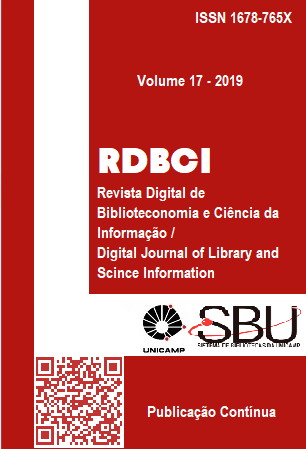Abstract
In our contemporary society, also known as information society, information is considered to be its most valuable asset. However, even though information is in the core of this new culture, its overwhelming volume triggers several problems. Freedom in communication, possible through the use of the Internet and social networks, associated with the lack of hierarchy in the production and dissemination on the its channels, results in a flood of information that hinders the ability of analysis and criticism from its users. Problems such as post-truth, fake-news and misinformation has become increasingly common and gave rise to questions regarding the quality of the members user of this society, considering that opinions are directly influenced by the information available on the Internet and social platforms. In light of the above, and foreseeing additional potential problems directly related to the extreme volume of information available to the public, it is seems fitting (and necessary) the performing of a literature research with the purpose of mapping actions to identify the fake-news in the context of post-fact, as well as to stop its production and dissemination.
References
BAUMAN, Zygmunt. Modernidade líquida. Rio de Janeiro: Jorge Zahar Ed., 2001.
BRASIL. Lei Nº 12.965, de 23 de Abril de 2014. Marco civil da internet. Disponível em: http://www.planalto.gov.br/ccivil_03/_ato2011-2014/2014/lei/l12965.htm. Acesso em fev. 2019.
BRASIL, Lei Nº 13.709, de 14 de Agosto de 2018. Lei geral de proteção aos dados. Disponível em http://www.planalto.gov.br/ccivil_03/_Ato2015-2018/2018/Lei/L13709.htm Acesso em fev. 2019.
CASTELLS, Manuel. A era da informação: economia, sociedade e cultura. In: A Sociedade em rede, Rodrigo G. de Azevedo. São Paulo: Paz e Terra, 1999. v. 1.
CASTELLS, Manuel. Internet e sociedade em rede. In: MORAES, D. (Org.). Por uma outra comunicação: mídia, mundialização cultural e poder. 3. ed. Rio de Janeiro: Record, 2005.
FONTES, Gabriela Scroczynski, GOMES, Icléia Rodrigues de Lima Cibercidades: as tecnologias de comunicação e a reconfiguração de práticas sociais. Inf. & Inf., Londrina, v. 18, n. 2, p. 60 – 76, maio/ago. 2013.
HIGGINS, K.; Post-truth: a guide for the perplexed. Nature, Londres, v. 540, n.9. 2106. Disponível em: http://www.nature.com/news/post-truth-a-guide-for-the-perplexed-1.21054. Acesso em: 19 fev. 2019.
KEYES, R.; The Post-Truth ERA: dishonesty and deception in contemporary life. New York: St. Martin’s Press, 2004.
LE COADIC, Yves-François. A ciência da informação. Brasília: Briquet de Lemos, 2004.
LEITE, Leonardo Ripoll Tavares, MATOS, José Claudio Morelli. Zumbificação da informação: A desinformação e o caos informacional. Revista Brasileira de Biblioteconomia e Documentação – v. 13, n. esp. CBBD 2017.
MARTELETO, R. M.; Análise de redes sociais- aplicação nos estudos de transferências da informação. Ciência da Informação, Brasília, DF, v.30, n.1, p.71-81, 2001.
MONTEIRO A. F.; Comunicação hi-tech: digital e pós-verdade política. In: PENSACOM BRASIL – GT5 Comunicação e Política, 1, São Paulo - SP, 2016.
OLIVEIRA, C. B; Uma proposta de arquitetura da informação para o processo de inovação em centros de pesquisas. Tese (doutorado) - Universidade de Brasília, Faculdade de Ciências da Informação, Programa de Pós-Graduação em Ciências da Informação (PPGCINF) – Brasília, 2012.
OXFORD DICTIONARIES. Oxford dictionaries word of the year 2016. Londres, 2016. Disponível em: https://www.oxforddictionaries.com/press/news/2016/12/11/WOTY-16. Acesso em: 19 fev. 2019.
SILVA, Helena et al. Inclusão digital e educação para a competência informacional: uma questão de ética e cidadania. Ci. Inf., Brasília, v. 34, n. 1, p.28-36, jan./abr. 2005.
SILVA, L. M.; LUCE, B.; FILHO, R. S.; Impacto da pós-verdade em fontes de informação para a saúde. Revista Brasileira de Biblioteconomia e Documentação – v. 13, n. esp. CBBD 2017.
Sociedade da informação no Brasil: livro verde / organizado por Tadao Takahashi. – Brasília: Ministério da Ciência e Tecnologia, 2000.
TOMAÉL, Maria Inês et al. Avaliação de fontes de informação na Internet: critérios de qualidade. Informação & Sociedade, João Pessoa, v.11, n. 2, p. 13-35, 2001.
VARELA, Aida. Informação e construção da cidadania. Brasília, DF: Thesaurus, 2007.
ZUCKERBERG, Mark. Conversation with Mark Zuckberg, 2016. Techonomy. Disponível em: http://techonomy.com/conf/te16/videos-conversationswith-2/in-conversation-with-mark-zuckerberg/. Acesso em 20 fev. 2019.
WERTHEIN, Jorge. Ci. Inf., Brasília, v. 29, n. 2, p. 71-77, maio/ago. 2000.

RDBCI: Revista Digital de Biblitoeconomia e Ciência da Informação / Digital Journal of Library and Information Science uses the Creative Commons (CC) license, thus preserving the integrity of articles in an open access environment, in which:
- This publication reserves the right to modify the original, regarding norms, spelling and grammar, in order to maintain the standards of the language, still respecting author writing style;
- The original documents will not be returned to the authors;
- Published works become Revista Digital de Biblitoeconomia e Ciência da Informação / Digital Journal of Library and Information Science's property, their second partial or full print being subject to expressed authorization by RDBCI's editor;
- The original source of publicaton must be provided at all times;
- The authors are solely responsible fo the views expressed within the document.






